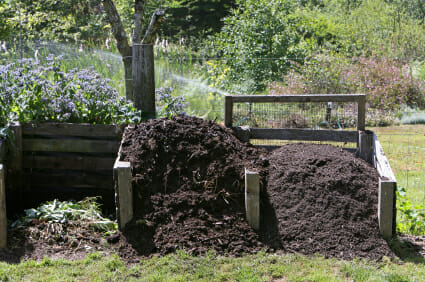Follow Us For Our Latest Posts, Tips, & Exclusive Facebook Giveaways
Composting is actually a lot easier than people make it sound. Not only is it easy, it’s also a cost effective and responsible way to reduce your garbage. It also makes an excellent, unparalleled fertilizer and soil amendment. You don’t have to start big either. My parents had a small five gallon compost bin in the back yard for kitchen waste that they used to feed their potted patio flowers. You can also go big- I now run a compost heap that’s twice as tall and wide as me, and each year I completely turn it with new material because of how much I use around the garden.
A good start on a compost bin consists of some chicken wire, tied together to form a cylinder, staked up with wooden lath. You can make it as tall or as short as you want. If you don’t want to go the wire bin route, you can make a simple border with 2×4’s, and layer material in that making a mound. This method of setting your compost heap on the ground encourages the natural microorganisms and creatures to assimilate themselves into your compost heap (a very good thing!) and naturally break it down that way.
When you put material into the heap to be broken down, you need to remember to mix heavy material with lighter material. All heavy material like chunks of sod and dirt on top of each other will starve out the oxygen that the animals in the soil need, creating an anaerobic environment favoring microorganisms that aren’t helpful in creating healthy compost. If you use mostly light materials like leaves, the organisms you need in the soil won’t infiltrate the leaves quickly, as they don’t provide the right environment for them to live in. Creating a mix, usually half and half is all you need to make the critters in the heap happy.
Some compost systems can be successful if kept off of the ground. Some people prefer to isolate their compost as it may be “cleaner”, keeping out potentially harmful animals. I’ve found my share of Japanese beetle grubs in my compost, but I don’t mind picking them out and tossing them on the lawn for the birds to eat. For others, this might not be within their comfort range. You can add worms from your dirt into the compost, or you can buy specially bred worms, like red worms, to break down and turn your compost for you. Either of these works well. In colder climates, compost heaps off of the ground may not generate enough of their own heat to keep them from freezing, but if you live in a climate that rarely touches freezing temperatures, this shouldn’t be a problem.
If you have a well-established compost heap that’s active and healthy, you shouldn’t need to grab a pitchfork and manually turn it every so often. But if your compost heap is new, turning it regularly is essential. Pulling the bottom up towards the top and fluffing the pile as you good is a good technique.
Almost any organic material is fair game for the compost heap. This includes kitchen garbage. Grass clippings, leaves, sod, plant waste, coffee grounds, banana peels, fruit rinds, orange peels, apple cores, anything like that is perfect for the compost. Things to leave out of the compost are other garbage- like plastics and large pieces of wood (unless you chip and break up the wood into smaller pieces). Metal should stay out of the heap too. Rubber products have no place in the compost. Just think of it this way- if it’s a plant, it can go in. Keep the pieces small and they’ll break down faster too.
Creating a healthy compost site will not only save you money, it’s also good for the environment. Your plants will love you for it too. It’s a lot easier than you may think, and it’s one good way to show Mother Nature and your garden that you care. There are many ways to go about it too, making it a hard thing to mess up. Enjoy free complete fertilizer at your fingertips with a homemade composting system!



